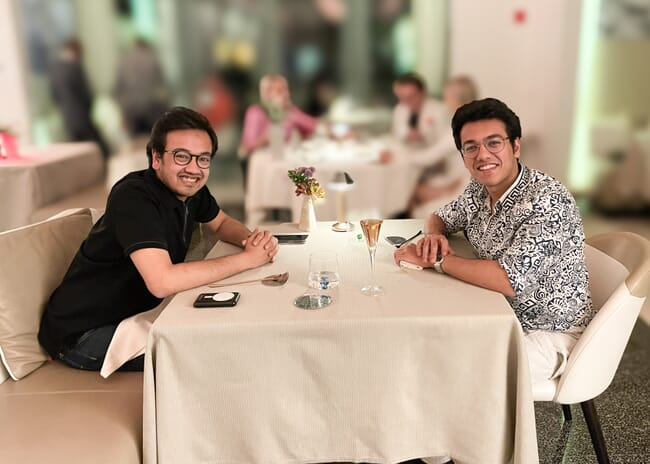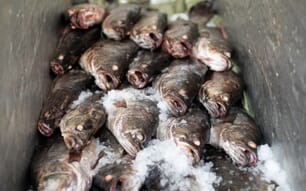
The brothers both grew up in India, before being sent to the US to study © Blue Wave Aquaculture
According to Agarwal, there’s a significant demand for trout in India but consumers face a fairly unpalatable choice – they can either opt for domestically-grown fish that aren’t always produced to a high standard, or rely on expensive alternatives that have been imported from Norway and Denmark.
It’s a situation that Blue Wave aims to capitalise on – by producing premium trout products in India at a significantly lower cost. Indeed, according to Agarwal, while the industry average for producing trout via RAS globally hovers around $26 per kg, Blue Wave’s production costs should be $10 per kg less, thanks to lower labour, transport and energy costs.
A startup is born
While Agarwal might not be a household name in the RAS sector, he does bring experience to go with his ambition. Raised in Kolkata, he went on to study entrepreneurship and marine biology at Bryant University in Rhode Island, before taking courses in aquaculture from Cornell and US Soy. This inspired him to set up a 2-tonne DIY catfish RAS when he returned to Kolkata before he moved on to a small, but more sophisticated, rainbow trout operation. It was a species that he found easier to work with, although he struggled to remain economically viable, blaming factors including the use of poor-quality equipment and stocks from basic breeding programmes.
Although neither of these early ventures turned a profit, he says they taught him invaluable lessons — especially the need to rely on proven RAS designs, top-tier technology, and high-quality, genetically advanced trout.
“This startup is all about de-risking RAS, and we've taken every step to make sure we're de-risking as much as possible,” Agarwal reflects. “The farm we’re building is designed with full redundancies – two boreholes, two intake water plants, backup generators for the backup generator,” he adds. As a result they plan to build their new 300-tonne farm using a system designed and supplied by Frea Aquaculture – which has its own 3,000-tonne trout farm in Denmark, as well as being known for its low-opex, energy-efficient RAS designs.
“When you see [Frea’s system] in operation, it’s like an orchestra performing in perfect harmony," Agarwal reflects.
Assembling a strong team
Agarwal founded the startup with his brother, Vatsal, who brings business building experience and will be in charge of sales. “We quickly realised that it's not just about growing fish anymore. You have to know how to sell the fish, too,” says the elder Agarwal brother. The brothers have also decided onboard a team of trusted RAS experts as advisors – including Michael Bech, CEO of Nordic Aquaculture Consultants and Thorsten Vammen, CEO of Frea. According to Agarwal, Frea will not only supply the infrastructure but also provide an on-site project manager during installation and for the first seven months of operation. As a result he hopes to avoid repeating his early mistakes, as well as those which he says are plaguing other RAS operators in his homeland – notably the use of poor quality equipment.
“Every RAS farm I’ve seen in India is not been able to match the quality and scale it aims to produce, and a lot of that has to do with poor equipment,” he notes

© Blue Wave Aquaculture
An investment opportunity?
With land acquired, licences secured, offtake agreements promised and infrastructure blueprints complete, Blue Wave is now at a critical point – having been self-financed so far, they are looking to raise around $2 million. According to Agarwal, they have already raised $800,000 of this figure and are prepared to offer 16 percent equity in the company to reach their $ 2million target.
If raised, this will be used to complete the build of the farm. In return the company is modeled to operate at 70 percent EBITDA with an IRR of 34 percent.
“We have everything – all the [other] puzzle pieces in place. The main puzzle block in the middle is the investor who believes in us,” he explains.
A catalyst for a new industry
Agarwal believes that the average Indian farmer has never had the chance to see what a commercial-scale RAS farm truly looks like – the land it can save, the quality it can produce, and the traceability it can offer. Although the government is training over 15,000 farmers in RAS technology, there are still no commercial farms to lead the way. Blue Wave wants to fill that gap. He believes the company can kick-start a major new sub sector of Indian aquaculture by building a farm – and a model – that is both scalable and replicable.
"In India it's a very copy-paste model. As soon as someone [is] doing something successfully, a bunch of people will want to come right there and put their money into the same thing," says Agarwal.
If their flagship farm proves its viability, the company plans to scale rapidly – potentially up to 4,000 tonnes annually. They are also considering establishing joint ventures with Frea to help other Indian farmers replicate the model.
"We want to capitalise on that with Frea because we believe that Frea is a perfect model for India,” he adds.
With sound technology, a clear go-to-market strategy, deep advisory support and skin in the game, Agarwal can envisage a time when he’s not just growing fish, but also cultivating the future of recirculating aquaculture systems In India.

Agarwal believes that, by using Frea's design and training, he can emulate their success © Frea








